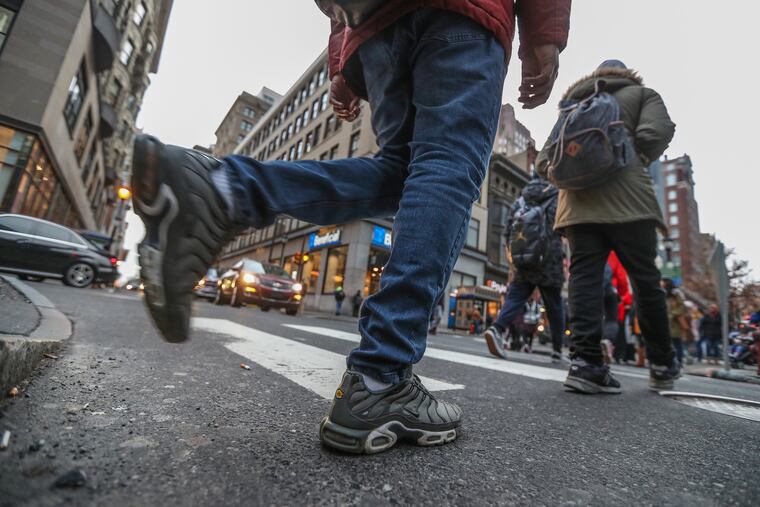Philly to consider new class of officer to fight Center City gridlock
Are a new class of officers a solution to Center City traffic in Philadelphia?

A new class of traffic enforcement officer is expected to be proposed Thursday in City Council to tackle gridlock afflicting Center City.
The officers would not carry firearms or have the power to arrest people, said Council President Darrell L. Clarke, but would be able to assist in managing traffic flow in the city.
"It is really problematic," Clarke said. "We've got to get a handle on traffic."
If approved by Council and signed by the mayor, the measure — an amendment to the City Charter — would appear as a ballot question in May. If voters pass it, the new officers could be appointed within six months, according to the ordinance.
The proposal is already facing opposition from police, who say giving traffic duties to non-sworn personnel isn't legal in Pennsylvania. Civil service rules and concerns about racial profiling are also likely to be raised as obstacles as Council considers the ordinance.
The combination of Philadelphia's population growth, the increase in truck traffic serving local businesses and delivering orders from online shopping, and the popularity of ride sharing in the city are contributing to a traffic nightmare. Narrow travel lanes can be made virtually impassible by one vehicle stopped to make a delivery.
A report from the Center City District earlier this year found the time needed to drive between Broad and 23rd Streets on Chestnut, Sansom, or Walnut Streets increased by 10 percent to 20 percent between 2013 to 2017. Public transportation was even slower, with those same trips by bus taking 25 percent to 40 percent longer.
Clarke's proposed ordinance would also task the new officers with enforcing quality-of-life crimes and code violations, and assisting with special events, along with regulating traffic flow. The ordinance, however, leaves many matters unaddressed, including what enforcement powers these officers would have.
John McNesby, president of the Fraternal Order of Police Lodge 5, said Wednesday that he would oppose Clarke's ordinance.
"They can propose whatever they want, but it's a job that's historically and traditionally been the job of police officers," McNesby said.
Clarke's office said it doesn't consider state law an obstacle. Firefighters, police auxiliary officers, and school crossing guards all play roles in traffic enforcement in Pennsylvania, said Jane Roh, a spokesperson for Clarke.
Special officers are not uncommon in other big cities. Chicago, Baltimore, Washington, and New York all use some form of traffic control officers. In New York, increased manned traffic enforcement coincided with a reduction in traffic deaths for four years straight, according to the New York philanthropic organization TransitCenter. Street redesign and red light cameras may have also played a significant role, though.
Clarke said he did not coordinate the crafting of his ordinance with the city's Office of Transportation and Infrastructure Systems (OTIS), which has been spearheading the city's safe streets initiative, Vision Zero. Clarke said he didn't think it was a problem that his efforts weren't being made in conjunction with their larger safe streets plans. "Vision Zero only works if you have enforcement," he said.
City officials have said there is a need for more traffic enforcement in Center City, though they have said creating a new class of officers could create challenges with the civil service system.
"Enforcement is key to managing congestion and traffic safety, and any ideas on how to bolster enforcement are welcome," Kelly Cofrancisco, a spokeswoman for OTIS, said Wednesday. "We're looking forward to discussing the Council president's idea in more detail and to better understand its benefits and costs as well as examine any labor ramifications."
The special officers would be civil service employees, but it wasn't clear what agency would hire them. Clarke envisions them being under the authority of the Police Department, and likely department employees. The ordinance did not state how many public safety enforcement officers would be needed. But in earlier conversations, Clarke had discussed the need for about 100 officers.
The specifics, he said, should be determined by the city administration and Police Department, with the mayor having the final authority on how many officers to hire. The city authorized an additional $20 million annually for the next five years for Police Department hiring, and Clarke proposed some of that money could go toward these special officers.
Police officials did not return calls for comment Wednesday.
The Police Department is at full strength for the first time in years, McNesby said, and there are ample officers to enforce traffic.
Traffic enforcement has not been high on the department's priorities recently. As of 2017, the department has been steadily issuing fewer traffic citations every year for the past five years.
Clarke argued that using some money to hire these special officers would free sworn officers to pursue criminal investigations.
"We can't be a city that has over 300 homicides a year," Clarke said, "and yet we're utilizing police officers to do traffic."
Human traffic enforcement also brings with it the possibility of bias and profiling, something advocates are keen to avoid in their efforts to make streets safer.
Clarke said that he trusted the training special officers would go through and that the worsening traffic issues required action.
"We used to manage decline in this city," he said. "Now we've got to figure out a way to manage growth."